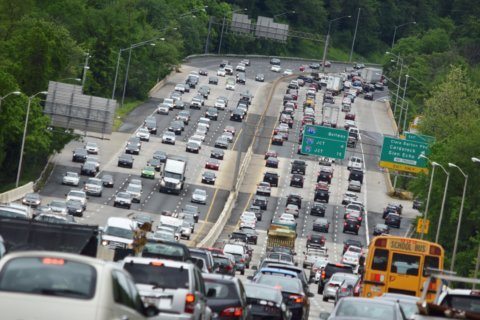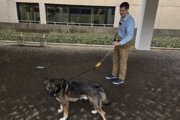WASHINGTON — A lawsuit was filed Monday against four D.C. cab companies by the American Council for the Blind after drivers were caught on camera passing a blind man with a service dog.
“The day that I spent out in the rain, the cold rain, doing this work with Channel 9 — it was incredibly frustrating, it was demoralizing and it showed clear discrimination,” says Eric Bridges, director of External Relations and Policy at the American Council of the Blind.
Bridges was with his service dog, General, as part of an undercover investigation with WUSA-TV to see if taxis were stranding disabled passengers.
In their report, several disabled people hailed for a taxi and many were ignored.
“This is not the first time I have experienced this type of discrimination, but it was the first time I was able to prove it as it was happening, and identify the specific drivers and vehicles,” said Bridges.
Those four companies who were specifically named in the lawsuit are Yellow Cab Company of DC, LLC., Grand Cab Company, Elite Cab Association, and Pleasant Taxi Club, LLC.
“All four of these drivers have violated the Americans with Disabilities Act and the D.C. Human Rights Act by refusing to pick me up because of my disability and because I use a specific mobility aid, which happens to be a guide dog,” Bridges explained. “This practice is unacceptable, has been allowed to persist for far too long, and the goal of the lawsuit is to ensure that this practice stops.”
And that’s where the Washington Lawyers’ Committee for Civil Rights comes in. They filed the lawsuit on behalf of Bridges and the American Council of the Blind.
“The taxi companies that are defendants in this action account for more than a thousand of our area taxis that are currently in the city,” stated Matt Handley, director of litigation with the Washington Lawyers’ Committee. “The laws that we have brought this case under, both the ADA and the DC Human Rights Act, have a number of remedies available, including potential court supervision of the taxi companies in addition to damages.”
“I should not be denied access to a taxi simply because I choose to use a guide dog instead of a white cane,” Bridges stated. “We work, pay taxes, take care of our families, and contribute to society just like everyone else and we deserve to be treated with respect and dignity.”
And the American Council for the Blind aims to put an end to discrimination against the blind.
“For far too long, we have been treated as second-class citizens simply because of ignorance, prejudice, and low expectations towards the blind,” said Melanie Brunson, executive director at American Council for the Blind. “The Americans with Disabilities Act was passed 25 years ago, and although we have come a long way since then, discrimination still exists, as evidenced by the wrongful conduct of these taxi drivers.”
The investigation involved several disabled people, however this lawsuit only focuses on Bridges’ experience during that report.







